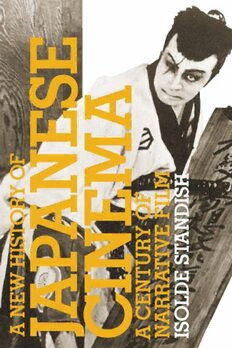
New History of Japanese Cinema: A Century of Narrative Film PDF
Preview New History of Japanese Cinema: A Century of Narrative Film
A NEW HISTORY OF JAPANESE CINEMA Also available from Continuum: Peter Bondanella: Italian Cinema, 3rd Edition: From Neorealism to the Present Remi Fournier-Lanzoni: French Cinema: From its Beginnings to the Present Joseph G. Kickasola: The Films of Krzysztof Kieslowski David Schroeder: Cinema's Illusions, Opera's Allure Alyn Shipton: A New History of Jazz Takemae Eiji: The Allied Occupation of Japan A NEW HISTORY OF JAPANESE CINEMA A CENTURY OF NARRATIVE FILM I S O L DE S T A N D I SH continuum NEW YORK • L O N D ON 2006 The Continuum International Publishing Group Inc 80 Maiden Lane, New York, NY 10038 The Continuum International Publishing Group Ltd The Tower Building, 11 York Road, London SE1 7NX www. continuumbooks. com Copyright © 2005 by Isolde Standish All rights reserved. No part of this book may be reproduced, stored in a retrieval system, or transmitted, in any form or by any means, electronic, mechanical, photocopying, recording, or otherwise, without the written permission of the publishers. Printed in the United States of America Library of Congress Cataloging-in-Publication Data Standish, Isolde. A new history of Japanese cinema : a century of narrative film / Isolde Standish. p. cm. Filmography: Includes bibliographical references and index. ISBN 0-8264-1709-4 (hardcover : alk. paper) 0-8264-1790-6 (paperback : alk. paper) 1. Motion pictures—Japan—History. I. Title. PN1993.5.J3S72 2005 791.43*0952—dc22 2004023894 For Michael 2 December 1966-1 June 2001 This page intentionally left blank CONTENTS Preface and Acknowledgments 9 Notes on Translation 11 Introduction: Towards a Politics of Cinema 13 1 Cinema, Modernity and the Shochiku Tokyo Studios 29 2 Cinema, Nationalism and Empire 80 3 Cinema and the State 133 4 Cinema and Humanism 174 5 Cinema and Transgression 220 6 Genres and Gender 270 Reflections 327 Notes 343 Select Filmography 365 Select Bibliography 3 87 Index 397 — 7 — This page intentionally left blank PREFACE AND ACKNOWLEDGMENTS THE WRITING of this study of Japanese narrative cinema in the twentieth century has been a humbling exercise that, upon reflection, makes me mar- vel at the arrogance with which I first took on the task. This became in- creasingly obvious as I confronted the breadth of the field to be addressed and the great scholarship of Japanese film historians and critics in whose wake I have followed. However, I feel now as I did when I first put pen to paper, that a new study, and perhaps more important a new approach, was called for, not only in the attempt to come to some sort of terms with the genealogy of what is broadly referred to as Japanese cinema, but more generally, to questions of how we should address the idea of 'national cinema'. In the contemporary age, when film production is dominated by trans- national conglomerations and changing technologies, eloquently discussed by Toby Miller et al. (2001), the question of what constitutes a 'national cinema' provides an alternative paradigm through which to reach a new understanding of cinema's symbiotic relationship to nation. Therefore, however inadequate, it is hoped that these reflections on what is one of the world's great cinematic traditions will open up new debates and new ave- nues for further profitable exploration of not only Japanese films but also the very idea of 'national cinema'. In the title of this study I have used the word 'narrative' to make a somewhat arbitrary distinction between what we broadly conceive of as 'fictional' and 'documentary' films. I fully accept that 'documentary' films are just as much narrative-based as that of mainstream 'fictional' cin- ema, however, as Brian Winston (1995) specifies in his introduction to Claiming the Real, definitions of documentary cinema tend to hinge on the relationship between 'image and reality' through claims to 'truth'. There- fore, in this study I am basing this distinction on the documentary film- makers' motivational claims to 'truth' and, as such, the reader will find no references to such noted Japanese documentary filmmakers as Ogawa — 9 —
